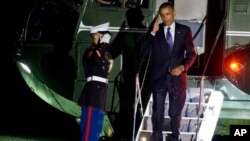U.S. President Barack Obama returned to the United States late Friday after a three-day foreign trip with stops in Sweden and Russia where he worked to rally international support for military action in Syria.
During the G20 summit in St. Petersburg, Russia, Obama held bilateral meetings with leaders of the world's major economies. He had support from French, Turkish and some other leaders, but Russian President Vladimir Putin remained adamantly opposed to any attack on the government of Syrian President Bashar al-Assad.
Back in Washington, Obama will take his case for targeted military strikes on Damascus directly to the American people in a televised speech Tuesday. The president has argued that the Assad government has violated an international ban and committed horrendous murders of civilians, a crime that he says cannot go unanswered.
Earlier Friday, in St. Petersburg, Obama said any strike on Syria would be aimed at degrading the government's chemical weapons capacity. He said the world must continue working toward a transition, however, that can restore stability, prosperity, peace and legitimacy to Syria.
U.S. Ambassador to the United Nations Samantha Power said the U.S. administration plan for limited military action against Syria is the least the world powers should do.
Speaking in Washington Friday, she said Assad has an enormous stockpile of illegal chemical weapons, and recent activity has barely put a dent [made a mark] in his arsenal.
And, Power said, the international community has not put a dent in Assad's willingness to use chemical weapons.
U.S. officials say they have evidence that more than 1,400 people were killed by poison gas in an attack on August 21 in areas on the fringe of Damascus populated by supporters of the opposition.
During the G20 summit in St. Petersburg, Russia, Obama held bilateral meetings with leaders of the world's major economies. He had support from French, Turkish and some other leaders, but Russian President Vladimir Putin remained adamantly opposed to any attack on the government of Syrian President Bashar al-Assad.
Back in Washington, Obama will take his case for targeted military strikes on Damascus directly to the American people in a televised speech Tuesday. The president has argued that the Assad government has violated an international ban and committed horrendous murders of civilians, a crime that he says cannot go unanswered.
Earlier Friday, in St. Petersburg, Obama said any strike on Syria would be aimed at degrading the government's chemical weapons capacity. He said the world must continue working toward a transition, however, that can restore stability, prosperity, peace and legitimacy to Syria.
U.S. Ambassador to the United Nations Samantha Power said the U.S. administration plan for limited military action against Syria is the least the world powers should do.
Speaking in Washington Friday, she said Assad has an enormous stockpile of illegal chemical weapons, and recent activity has barely put a dent [made a mark] in his arsenal.
And, Power said, the international community has not put a dent in Assad's willingness to use chemical weapons.
U.S. officials say they have evidence that more than 1,400 people were killed by poison gas in an attack on August 21 in areas on the fringe of Damascus populated by supporters of the opposition.





